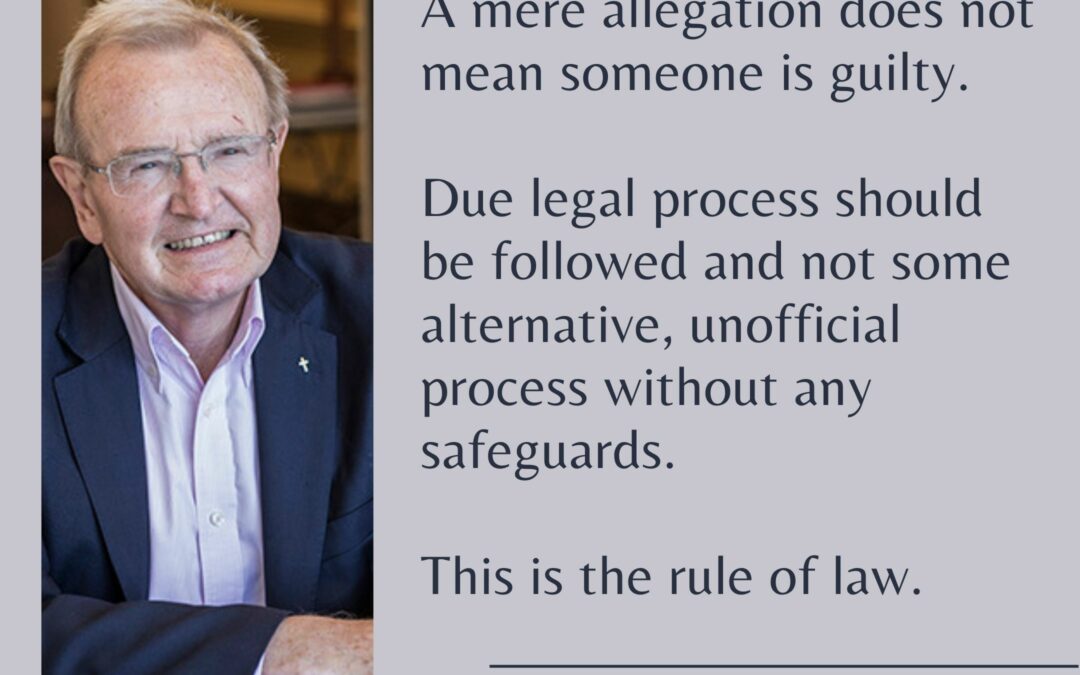The role of the Attorney General is not political or personal, he occupies a role which transcends these interests.
LJ King wrote in the Western Australian Law Review in October 2000;
“…a special responsibility for the rule of law and the integrity of the legal system which transcends, and may at times be in conflict with political exigencies, the Attorney-General has the unique role in government of being the political guardian of the administration of justice”
In addition, the Attorney General must perform these functions even though he might be under personal discomfort and pressure.
The present Attorney-General finds himself in this position following being accused of a rape many years prior to being appointed as the Attorney-General. He has denied the accusation and the New South Wales police have investigated the matter and decided that there is insufficient evidence to prosecute. Despite this, and there being no suggestion that the investigation was conducted other than in a proper and independent manner, or that there are new facts, there has been incredible pressure on him to face some sort of a unofficial inquiry and resign.
1. Anyone accused of a criminal offence in Australia is entitled to be presumed innocent unless the contrary is proved.
He or she is not presumed to be guilty of the alleged offence.
That is the Rule of Law in operation in Australia.
On the presumption of innocence hang the protections which are enjoyed by all Australians no matter their might, status, religion or wealth, nor importantly lack thereof. He or she is protected from being coerced into giving testimony, to incriminate oneself and to have one’s case heard in open court, to have legal counsel, to have one’s sentence pronounced publicly, to present evidence in one’s defence and conduct a vigorous defence.
People tell the truth, lie, give false evidence and do all things in between. They may do this as the accused, complainant or potential witness in the course of attempting to prove guilt or innocence. This is a fact of human nature and why a person is presumed innocent, not a saint. The presumption presumes the best in us and not the worst, it places humans on a higher plane which is crucial in the administration of justice.
We enjoy the Rule of Law without thinking about it until we realise that it is not the position in most other countries where might is right and there is no presumption of innocence.
2. The Rule of Law is not guaranteed by statute, it is a fundamental community aspiration.
You cannot sue if it is broken. That is its strength and weakness and reflects the checks and balances in our system. It is in these circumstances that the role of the Attorney-General is critical. He is the first law officer in Australia and as such is responsible to uphold the Rule of Law and protect the administration of justice. This is not a personal attachment: it is attached to the office of Attorney-General.
Mr Porter cannot run away from this by resigning no matter how uncomfortable it may be for him personally.
L J King further wrote:
“It is the special role of the Attorney-General to be the voice within the government and to the public which articulates, and insists upon observance of, the enduring principles of legal justice, and upon respect for the judicial and other legal institutions through which they are applied.”
In addition, as an ordinary Australian, Mr Porter is subject to and has the protection of the Rule of Law.
That is the Rule of Law in operation in Australia.
3. It is part of the Rule of Law that due legal process is followed not some alternative unofficial process.
Here the due legal process is an investigation by the police, and if sufficient evidence, to prosecute in the courts.
That is the Rule of Law in operation in Australia.
As Tatum Hands and Danielle Davies wrote:
“As demonstrated by the Murphy case, conduct of a criminal nature is appropriately dealt with first by police investigation and then by the judicial system. A statement by either the Attorney-General or the JCA would suffice to ensure the public is aware in these circumstances that the law must takes its course.”
The Rule of Law Institute of Australia considers the Attorney-General must not resign as the proper legal process has been followed; an independent police investigation and an open decision not to prosecute in the courts.
That is the Rule of Law in operation.
It is not compatible with the Rule of Law that the police investigation be followed by some form of unofficial investigation, which has an unknown agenda and scope … other than to find Mr Porter guilty of something, anything. To resign in the face of such would be a failure to uphold the Rule of Law and a failure to be the guardian of the administration of justice.
Rule of Law Institute of Australia
Robin Speed

